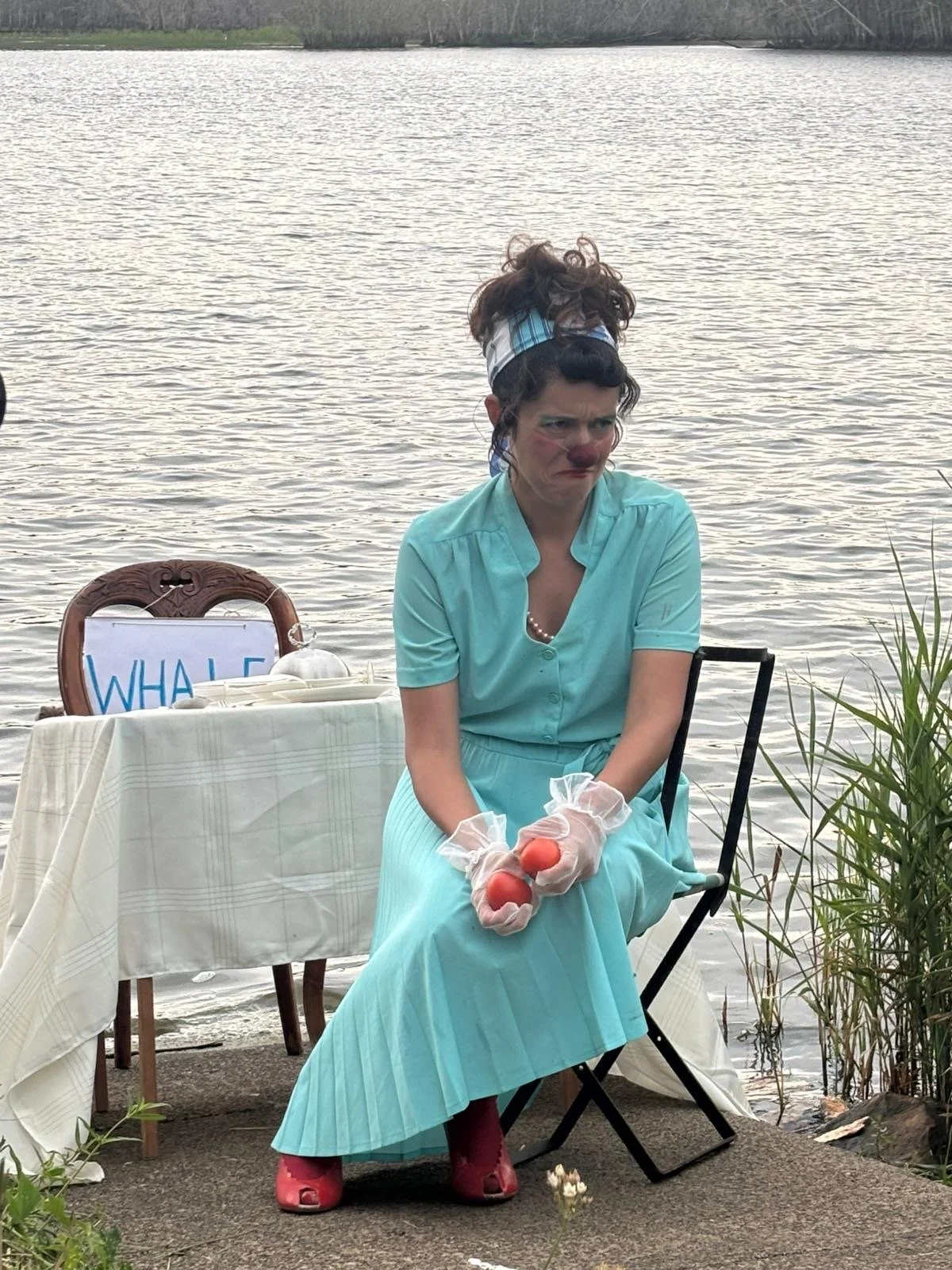The clown who makes people sad (on purpose)
Most people think the clown arrives to make everyone laugh. Bubbles, slapstick, a rubber chicken. But for a while I’ve been circling a different creature entirely: a clown who makes you feel something you didn’t give yourself permission to feel. A clown who doesn’t chase joy but excavates it through the fault-lines of sadness. A kind of emotional alchemist: turning nonsense into meaning, like a street magician pulling red silk handkerchiefs out of a wound.
This investigation has been unfolding in my recent work, especially in the piece I performed at HeartDancer’s Wonders of Water called W(h)ale.
In the piece, I wait for a whale who never comes.
That’s it.
I wait. I set the table for her. I mop the shoreline for her arrival. I ask the audience to help hang a painting in preparation, as if the room must be beautiful for a guest as large as grief. Premonition floats in the air like salt.
Afterwards, some adults said the imagery landed in layers they couldn’t quite name. But the most astonishing feedback came from children, who said:
I didn’t like it because the whale never came. It made me feel sad.
Yes. Exactly. The theatre worked.
When was the last time a child, or an adult, felt something real at the pace we’re living? When was the last time anyone sat around a screen and felt grief, longing, rage, or wonder without skipping to the next episode after seven seconds? When was the last time Netflix let anyone sit inside a feeling without rescuing them from it?
The whale didn’t come, and the children were upset, and nobody died from that sadness. In fact, they felt the truth: sometimes the thing we long for does not arrive. Sometimes the world breaks a tiny bit inside us, and we must grow around the absence.
Some people call that ecological grief, the ache that rises when something from the more-than-human world disappears or changes shape. I didn’t set out to teach that. I only waited for a whale. The rest, their bodies understood.
Pain as a playmate
I used to think the job of the clown was to make everything lighter. I don’t think that anymore. The clown is not a cheerleader. The clown is a smuggler of truth. A clown takes the things we are taught to hide such as grief, fear, longing and reveals them with the honesty of a child holding a broken seashell:
Look. It’s cracked. Isn’t it interesting? Will you help me understand it?
Pain becomes a kind of playmate…not a comfortable one, but a necessary one. And if we stay with it long enough, letting the ridiculous and the sacred sit together at the same chipped table, something begins to shift. Grief becomes ingredient, not ending. A tide turning over stones.
Joy in mourning clothes
This thread has also been alive in my work in Enclownter with Joy, through a character named Joy. Joy dresses as if she’s attending a funeral. Black dress. Veil. Mourning as costume. People approach her with one mission: to make Joy laugh.
It reverses the usual transaction. The clown isn’t there to entertain you. You are there to resurrect her. And something extraordinary happens when a crowd tries to resuscitate joy itself. They fail. They try again. They fail better, to borrow from Beckett. And somewhere amid the silliness, someone giggles, and the giggling spreads, and suddenly grief and absurdity are dancing so closely you can’t tell one from the other.
It’s a strange medicine, but it works.
Why make people sad?
I get this question, directly or between the lines. But here is what keeps ringing true:
We are not suffering from a shortage of happiness.
We are suffering from a shortage of felt experience.
Numbness is the great global epidemic. The clown breaks numbness. The clown says:
Feel something. Even if it’s uncomfortable. Even if it’s sadness because a whale never came.
Grief, especially grief for the world, is not a malfunction. It is proof that we are still in relationship.
A working theory
A clown does not turn sadness into joy.
A clown reveals that they are not separate.
The laugh and the sob are neighbours sharing a wall.
So, the whale may never come.
And the audience may ache.
And the children may say, I didn’t like it, it made me sad.
And I will keep going, trusting that feeling something, anything, is the beginning of remembering we are alive.
Somewhere in the distance, under all that water, a whale is singing. I want to make work that helps us hear it again.



